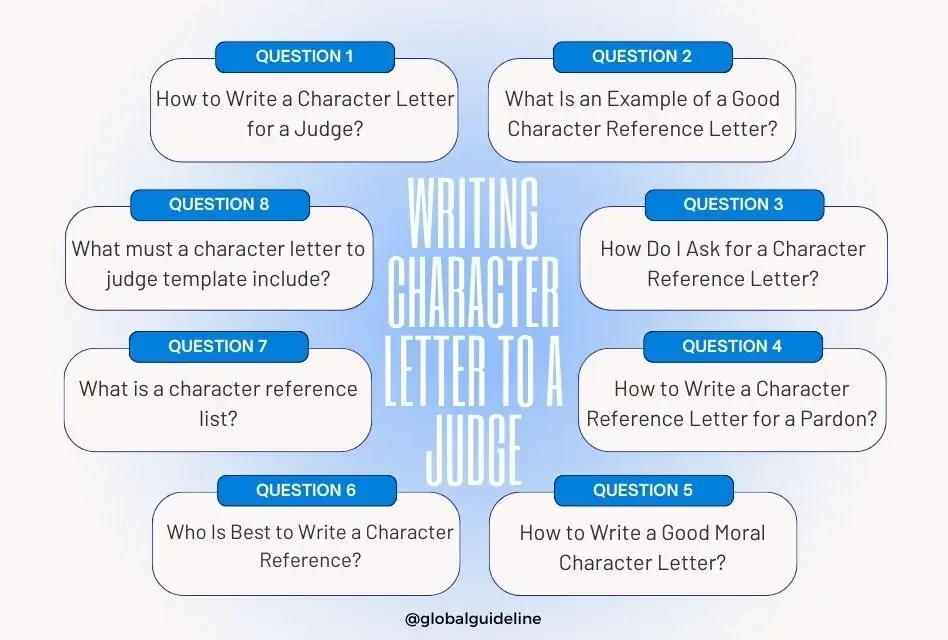A character letter to a judge is an important document related to the issues of sentencing, custody, and leniency for a defendant. These letters can give a personal touch on the character of a defendant that a judge is supposed to consider when he or she makes his or her final decision in sentencing. Whether it is a character letter to a judge for a friend, family member, or coworker, the information should be provided straight and with courtesy. This article will help you learn 10 tips essential in making your character letter to a judge powerful in the USA.
Table of Contents

1. Know the Purpose of the Character Letter
First, it is important to consider the purpose the character letter to the judge will serve. The character letters serve to give a glimpse into the defendant’s character, their positivity, and how they contribute to society. The defendant has to be humanized based on what is presented in the legal documents, thereby bringing forth insights. Explore more about the differences between an attorney and a lawyer on this site.
Why is this Important?
- Humanizes the Defendant: The judge gets to know the person, not the case number.
- Adds Context: It provides context about the person that is often missing from the legal context of a courtroom.
2. Use a Professional Tone and Format
The letter should be formal, respectful, and honest in tone. Judges are used to formal, legal letters; your letter should therefore be transparent, well-structured, and free from slang or colloquial speech.
Key Components to Address:
- Header: Your name, address, phone number, and email.
- Date: The date when the letter is written.
- Salutation: Dear Judge [Last Name],
3. Make a Direct Introduction
Your opening should be an introductory sentence that identifies who you are, your relationship to the defendant, and the purpose of the letter. This sets the tone and makes sure the judge knows straight off why they should continue to read.
Example Introduction:
“Dear Judge Smith,
My name is Jane Doe, and I have known John Doe for over 15 years as a close family friend. I am writing this character letter to you in hopes that I may be able to provide insight into John’s character and request leniency during his sentencing.”
4. Give Specific Examples of Positive Characteristics
In the body of the letter, give certain examples that will reflect on the positive characteristics of the defendant. These examples shall speak about the good moral character of the defendant, commitment towards the family or community involvement, or professional achievements.
Examples:
- Community Involvement: “John always participated in our community through his regular volunteering at the local food bank every weekend.”
- Family Commitment: “He is a committed father and has never missed any of the school events his children have taken part in.”
5. Be Honest and Sincere
Honesty is one of the most important ingredients in character writing to a judge. One should not exaggerate the quality of a defendant or make any claim that cannot be substantiated. The judges are more than likely to see through when one is not truthful, and this might cause further harm to the defendant’s case.
Why Honesty Matters:
- Credibility: You first establish credibility by being truthful.
- Effectiveness: A really effective character letter is one that feels quite genuine and sincere.
6. Describe the Role of the Defendant in the Community
An excellent character letter should highlight how the defendant has contributed to their community, be this via volunteer work, spearheading community projects, or simply being a trustworthy and pleasant neighbor in the community.
Example:
“John has been a pillar in our community, often organizing charity events and helping neighbors in need. His dedication to improving our town is well-known and deeply appreciated.”
7. Address the Defendant’s Potential for Rehabilitation
Judges often base their decisions partly on the chances that the defendant will be successfully rehabilitated. If at all possible, stress the defendant’s acceptance of responsibility to make amends for his/her actions, his/her remorse, and any efforts he/she has begun toward self-improvement.
Sample:
“John has expressed deep remorse for his actions and has begun counseling in the hopes of gaining a deeper understanding of why his actions were wrong and how he can fix them.”
8. Acknowledge the Severity of the Situation
This doesn’t mean that your letter should not be of a supportive nature but meanwhile, it has to touch on the seriousness of the situation. That means you actually consider the severity of the case and do not take the charges against the defendant lightly.
How to Address It:
- Balance: “I do acknowledge that the charges brought against John are grave, but I hope the court could consider his positive contributions and his capacity for rehabilitation.”
9. Close with a Courteous and Respectful Conclusion
To close the letter, summarize your main points and reiterate your request, whether it be for leniency, a specific sentence, or another disposition. Thank the judge for taking the time to read and consider your letter.
Sample Closing:
Conclusively, I humbly pray the court to put into consideration John’s positive input to our community and his potential for rehabilitation. Thank you for considering taking the time over this matter.
10. Proofread and Edit Before Submission
Take a moment to read and edit the letter before you send it. A well-written, polished letter shows respect and indicates that you are serious about your communication with the court.
Proofreading Tips:
- Reading Aloud: This will help you identify some phrases that do not fit well or that are grammatically incorrect.
- Use Tools: Grammar check with grammar-checking tools to see that everything is perfect.
- Seek Feedback: Have another person read it to offer feedback.

Character Letters to a Judge Examples
Sometimes seeing an example is better to explain how to format your letter and what type of content to include. The following are a few examples of different character letters to a judge:
Character Letter to Judge for Sentencing
“Dear Judge Smith,
I have known John Doe for many years-first as a colleague, then as a friend. Through all these years, John presented a picture of integrity: always kind to other people and, above all, devoted to his family and community. I do realize the seriousness of the charges against him; however, I would like to request that his service to society and potential for rehabilitation be taken into account during sentencing.
Thank you for your time and consideration.
Sincerely,
Jane Doe”
Character Letter to Judge for Child Custody
“Dear Judge Smith,
My name is Jane Doe, and I am writing on behalf of my sister, Mary Doe, regarding her ongoing custody case. Mary is a devoted mother who always put the best interest and happiness of her children first. She is loving, responsible, and provides a stable home environment. I hope that you will consider these qualities in your decision.
Thank you for investing time in reading this.
Sincerely,
Jane Doe”
FAQs About Writing Character Letter to a Judge
How to Write a Character Letter for a Judge?
Writing a character letter to a judge starts by formatting it in a professional manner, followed by the identity of the writer and his or her relationship with the defendant. Specific instances highlighting the positive attributes of the defendant are very helpful in this regard. Be honest and show that you take the matter seriously. At the close of the letter, do so respectfully.
What Is an Example of a Good Character Reference Letter?
A good character reference letter is one that speaks truly, specifically, and supportively of the defendant’s contributions to his community.
How Do I Ask for a Character Reference Letter?
When asking someone to write a character reference letter for you, be polite and provide them with background about your case and what you would like them to address. It is useful if you are able to provide them with examples or even a template in order to assist them.
How to Write a Character Reference Letter for a Pardon?
A character reference letter of support for pardon applications will focus on the defendant’s remorse, rehabilitation steps, and societal contributions post-offense. The support letter should advocate for a second chance for the defendant.
How to Write a Good Moral Character Letter?
A morally good character letter of recommendation should emphasize the fact that the defendant is a morally upright, decent individual committed to doing right. Give examples as to how such character works itself out in life and living.
Who Is Best to Write a Character Reference?
The best person to write a character reference is someone who knows the defendant well and can speak credibly about their character. This would be a friend, a family member, employer, or community leader.
What is a character reference list?
The character reference list is a paper that includes the names, addresses, and phone numbers of people who may give favorable references to the defendant’s character.
What must a character letter to judge template include?
A character letter to judge template should comprise the writer’s contact information, date, name of judge, introduction, body paragraphs explaining the defendant’s character, and a respectful conclusion.

Conclusion
Writing a powerful character letter to the judge is a huge responsibility. The letter should be honest, specific, and supportive whether you are writing a character letter for sentencing, child custody, or leniency. Following the 10 key tips in this guide, you will be able to provide a letter which may positively affect the judge’s decision with the opportunity of a more complete view regarding character and potential rehabilitation for the defendant. Always remember to proofread and edit your letter before submitting it to make sure that it is polished and professional.
When things get tough, that character letter may well make the difference. Be it as a friend, family member, or employer, your words will go far to provide context and insight that no legal document can.










